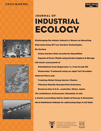
JOURNAL OF INDUSTRIAL ECOLOGY
Scope & Guideline
Pioneering Insights into Ecological Industrial Practices
Introduction
Aims and Scopes
- Life Cycle Assessment (LCA) and Material Flow Analysis (MFA):
The journal emphasizes studies utilizing LCA and MFA to evaluate the environmental impacts of products and processes, providing insights into resource consumption and waste generation. - Circular Economy Strategies:
Research on the development and implementation of circular economy frameworks, including innovative business models, product design, and resource recovery techniques, is a key focus area. - Sustainable Resource Management:
The journal addresses themes related to the sustainable management of natural resources, including critical materials and their lifecycle impacts, promoting practices that reduce ecological footprints. - Industrial Symbiosis and Ecosystem Services:
Studies exploring the synergies between industries for mutual benefit, as well as the valuation of ecosystem services in industrial settings, contribute to the journal's core objectives. - Socioeconomic Dynamics and Policy Analysis:
The journal includes research that examines the social implications of industrial ecology practices, including equity, governance, and the role of policy in facilitating sustainable transitions.
Trending and Emerging
- Digitalization and Data-Driven Approaches:
There is a growing emphasis on the use of machine learning, big data, and digital tools to enhance the analysis of material flows and life cycle assessments, reflecting the integration of technology in sustainability research. - Circular Design and Product Lifetimes:
Research focusing on circular product design, including strategies for extending product lifetimes and enhancing repairability, is increasingly prominent as industries seek to reduce waste and improve resource efficiency. - Climate Change Mitigation Strategies:
Emerging themes around the integration of industrial ecology with climate change mitigation efforts highlight the role of sustainable practices in reducing greenhouse gas emissions across various sectors. - Stakeholder Engagement in Sustainability:
There is a trend toward understanding the perspectives and behaviors of stakeholders in circular economy transitions, emphasizing the importance of societal engagement and public policy. - Sustainable Supply Chain Management:
The journal is increasingly publishing research on the sustainability of supply chains, focusing on circular economy principles and the reduction of environmental impacts throughout the supply chain.
Declining or Waning
- Traditional Environmental Impact Assessments:
There has been a noticeable decrease in studies solely focused on traditional environmental impact assessments without integration into broader industrial ecology frameworks, as the field increasingly favors holistic approaches. - Single-Use Material Studies:
Research centered around single-use materials and their environmental impacts is becoming less frequent, as the focus shifts towards circular solutions and multi-use systems. - Linear Production Models:
Research that adheres strictly to linear production models is declining as the industrial ecology community increasingly advocates for circular economy principles and systems thinking. - Focus on Localized Case Studies:
The journal is moving away from localized case studies that do not connect to broader systemic issues, as there is a growing emphasis on global supply chains and transboundary environmental impacts. - Narrow Technical Assessments:
There is a waning interest in narrowly focused technical assessments that lack interdisciplinary perspectives, as the journal seeks to publish more integrative and comprehensive research.
Similar Journals
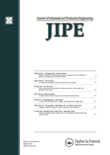
Journal of Industrial and Production Engineering
Connecting Theory and Application in Industrial EngineeringWelcome to the Journal of Industrial and Production Engineering, a premier academic publication dedicated to advancing the fields of Industrial Engineering and Production Engineering. Published by TAYLOR & FRANCIS LTD, this journal has established itself as a vital resource for researchers, professionals, and students seeking to enhance their understanding of engineering processes and systems. With an impressive 2023 quartile ranking of Q1 in Industrial and Manufacturing Engineering and Q2 in Control and Systems Engineering, the journal reflects a robust impact within its discipline, underscoring its commitment to disseminating high-quality, peer-reviewed research. Covering a comprehensive range of topics from optimization techniques to innovative production systems, the Journal of Industrial and Production Engineering not only facilitates scholarly dialogue but also fosters practical applications that address contemporary industrial challenges. Although not an Open Access journal, it continues to serve as an essential platform for sharing valuable insights within the engineering community.

ENVIRONMENT DEVELOPMENT AND SUSTAINABILITY
Innovating Pathways to Sustainable FuturesEnvironment, Development and Sustainability is a leading academic journal published by Springer, dedicated to advancing the understanding of the intricate relationships between environmental processes, human development, and sustainable practices. With an ISSN of 1387-585X and an E-ISSN of 1573-2975, this journal provides a platform for high-quality interdisciplinary research that integrates insights from economics, geography, and environmental policy. As of 2023, the journal boasts an impressive impact factor ranking, positioned in the Q2 category for Economics and Econometrics, Q1 for Geography, Planning and Development, and Q2 for Management, Monitoring, Policy and Law. This impressive stature has earned it a significant Scopus ranking, placing it within the top tiers of its field, particularly in Social Sciences and Environmental Science. With a publication timeline extending from 1999 to 2024, the journal serves as a valuable resource for researchers, professionals, and students alike, promoting knowledge exchange and fostering groundbreaking ideas essential for sustainable development. Although it operates under a subscription model, the impact of its articles is profound, making it a pivotal outlet for researchers striving towards sustainability in a rapidly changing world.
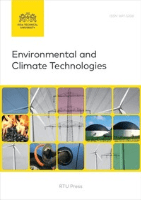
Environmental and Climate Technologies
Uniting Ideas to Combat Climate Challenges.Environmental and Climate Technologies is a premier open-access journal dedicated to advancing knowledge in the fields of environmental science and renewable energy. Published by SCIENDO since 2009, this journal plays a crucial role in disseminating innovative research and interdisciplinary studies that address the pressing challenges posed by climate change and sustainable development. With its current positioning in the Q2 quartile for Environmental Science (miscellaneous) and Q3 for Renewable Energy, Sustainability and the Environment, it is recognized for its significant contributions to the academic community, ranking #107 out of 233 in General Environmental Science and #161 out of 270 in Renewable Energy. Hailing from Germany and operating under an open-access policy, Environmental and Climate Technologies ensures that research remains accessible to a global audience, fostering collaboration and discussion among researchers, professionals, and students alike. The journal invites rigorous scientific inquiries and practical solutions that can mitigate the impact of climate-related issues, making it a vital resource for those committed to environmental stewardship and sustainability.
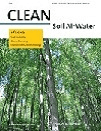
CLEAN-Soil Air Water
Transforming Research into Action for a Healthier PlanetCLEAN-Soil Air Water, an esteemed journal published by Wiley, serves as a vital platform for disseminating research in the fields of environmental chemistry, pollution, and water science and technology. Operating under an Open Access model, it embraces the principles of knowledge sharing, making significant research findings readily accessible to a global audience. With an ISSN of 1863-0650 and an E-ISSN of 1863-0669, the journal has demonstrated its importance in the academic community, reflected in its Scopus rankings within the top quartiles of its categories. Established in 2007 and continuing through to 2024, CLEAN-Soil Air Water offers researchers, professionals, and students an opportunity to explore innovative studies that address pressing environmental challenges, facilitating an exchange of novel ideas and techniques essential for sustainable development. With a publication footprint in Germany and a growing international reputation, this journal is an invaluable resource for those dedicated to advancing the science and practices of environmental stewardship.

Resources Conservation & Recycling Advances
Empowering change through knowledge in resource management.Welcome to Resources Conservation & Recycling Advances, an influential open-access journal published by Elsevier since its inception in 2021. With an ISSN of 2667-3789, this journal serves as a vital platform for disseminating cutting-edge research in the fields of economics, waste management, and environmental science. Recognized for its high impact, it proudly holds a Q1 ranking in both Economics and Econometrics as well as Waste Management and Disposal, highlighting its significance within these critical categories. The journal aims to advance understanding and innovation in resource conservation and recycling practices, making it an essential resource for researchers, professionals, and students dedicated to sustainability. With its current Scopus rankings placing it in the top percentiles—34th out of 716 in Economics and Econometrics and 21st out of 134 in Waste Management—Resources Conservation & Recycling Advances continues to contribute to meaningful discussions and developments in the pursuit of a more sustainable future.
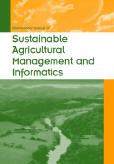
International Journal of Sustainable Agricultural Management and Informatics
Empowering research to bridge agriculture and sustainability.The International Journal of Sustainable Agricultural Management and Informatics, published by INDERSCIENCE ENTERPRISES LTD, stands at the forefront of advancing knowledge and practice in the fields of agricultural management and informatics. With a focus on sustainability, this journal addresses the urgent need for innovative strategies that harmonize agricultural productivity with ecological preservation. Since its inception in 2015, the journal has established itself as a crucial resource, with a notable presence in the 2023 Q3 quartile across several categories including Agricultural and Biological Sciences, Business Management, and Economics. The journal aims to disseminate high-quality research that appeals to a diverse audience, integrating informatics into sustainable practices in agriculture, thus fostering interdisciplinary dialogue and collaboration among researchers, practitioners, and policymakers. Although currently not an open-access journal, its publication ensures that vital research reaches the forefront of scientific and practical discourse, contributing to a sustainable future in agriculture.
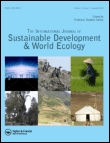
INTERNATIONAL JOURNAL OF SUSTAINABLE DEVELOPMENT AND WORLD ECOLOGY
Advancing global insights for sustainable futures.The INTERNATIONAL JOURNAL OF SUSTAINABLE DEVELOPMENT AND WORLD ECOLOGY, published by TAYLOR & FRANCIS INC, stands as a pivotal resource for scholars and practitioners focused on sustainable development and environmental ethics. With an ISSN of 1350-4509 and an E-ISSN of 1745-2627, this journal has made significant strides in the academic landscape since its inception in 1994, aiming to address the complex interrelations between ecological sustainability and development policies on a global scale. Renowned for its rigorous peer-review process, it has achieved a prestigious Q1 classification in both Geography, Planning and Development and Management, Monitoring, Policy and Law, highlighting its influence and relevance among the top tier of scholarly publications. As evidenced by its impressive rankings in Scopus—32nd in Geography and 34th in Environmental Science—this journal plays a critical role in shaping contemporary discourses on sustainable practices. Although it does not currently offer Open Access options, the journal is dedicated to providing a platform for innovative research that not only informs policy-making but also fosters a deeper understanding of global environmental challenges. Whether you are a researcher, policymaker, or student, engaging with the latest findings published in this journal will enhance your insight into sustainable development paradigms.
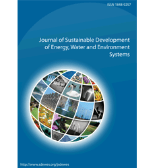
Journal of Sustainable Development of Energy Water and Environment Systems-JSDEWES
Exploring Interdisciplinary Approaches to SustainabilityJournal of Sustainable Development of Energy Water and Environment Systems (JSDEWES), published by the International Centre for Sustainable Development of Energy, Water, and Environment Systems, is a premier Open Access journal that has been shaping the discourse surrounding sustainable energy, water management, and environmental systems since its inception in 2013. Based in Croatia, this esteemed journal, bearing the ISSN 1848-9257, emphasizes an interdisciplinary approach, making significant strides within its converged years from 2013 to 2024. With impressive rankings in 2023—Q3 in Energy Engineering and Power Technology, Q2 in Environmental Science (miscellaneous), and noteworthy positions in Renewable Energy, Sustainability and the Environment, and Water Science and Technology—JSDEWES showcases its commitment to advancing knowledge and innovation in crucial areas affecting our planet's sustainability. Designed for an audience of researchers, professionals, and students alike, this journal is pivotal in fostering research that enhances our understanding and implementation of sustainable practices, while its esteemed Scopus rankings further underline its impact and contribution to the field.

Resources Environment and Sustainability
Championing Interdisciplinary Dialogue in Environmental ResearchResources Environment and Sustainability is a premier academic journal published by ELSEVIER, dedicated to advancing knowledge in the fields of environmental science, engineering, and sustainability practices. Recognized for its rigorous peer-review and high-quality research, the journal boasts an impressive impact factor and consistently ranks in the first quartile across multiple categories, including Environmental Engineering, Environmental Science, Management, Monitoring, Policy and Law, and Pollution. With its Scopus rankings placing it among the top journals—#7 in Environmental Science and #12 in Environmental Engineering—this journal provides a vital platform for researchers, professionals, and students seeking to contribute to evolving policies, innovative management strategies, and cutting-edge environmental solutions. Hosted in the Netherlands, Resources Environment and Sustainability is committed to fostering interdisciplinary dialogue and disseminating high-impact research that addresses the pressing challenges of our times. This journal embraces open access principles, ensuring that the wealth of knowledge it publishes remains accessible to a global audience.

Management and Production Engineering Review
Connecting Theory with Practice in Management and ProductionManagement and Production Engineering Review, published by the Polish Academy of Sciences, stands as a pivotal platform for disseminating research in the realms of management, production engineering, and related fields. This journal operates under a commitment to providing high-quality, peer-reviewed articles that explore a range of impactful topics including business management, industrial engineering, and technology innovation. With a steady convergence period from 2012 to 2013 and continuing until 2024, it has earned a commendable position in the academic landscape, achieving a Q3 ranking across several critical categories like Business and International Management, Organizational Behavior, and Management Science. Its Scopus rankings reflect its emerging influence, particularly in the Industrial and Manufacturing Engineering sector, where it holds a rank of #173 out of 384. Although it does not offer an Open Access option, the journal remains a vital resource for academics and professionals seeking to expand their understanding and contributions to contemporary practices in management and production engineering.